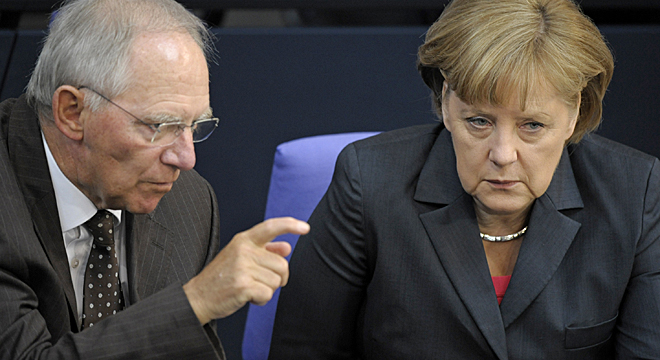The political and economic dynamics threatening the European monetary union are complicated enough on their own. But there’s tremendous uncertainty about which choices European voters and leaders will make, and each hypothetical outcome there prefigures even more difficult-to-forecast consequences in the United States.
Still, economists and analysts have examined a range of scenarios — from ongoing recession in Europe, to a disorderly dissolution of the Euro and ensuing depression. And even the least bad of likely outcomes across the Atlantic will continue to put downward pressure on already-sluggish U.S. economic growth.
Late last year, Reuters looked at the consequences for the U.S. of a mild European recession, a protracted Euro recession, and a full-on meltdown. The upshot is that the American recovery can weather the Euro crisis even if leaders there insist on muddling through instead of taking the sorts of politically difficult actions experts say would be required to fix the problems there.
That was November 2011. Since then the U.S. economy has cooled down. But the same basic threat assessment holds up today, according to Dean Baker, co-founder of the Center for Economic and Policy Research.
“[E]xports to the region are only about 2 percent of U.S. GDP,” he said. “If exports are down by 10 percent because of the crisis (a huge falloff), this only knocks around 0.2-0.3 [percentage points] from U.S. GDP.”
Mitigating that loss are some hidden, salutary side effects. Energy prices have fallen. And the crisis there has actually pushed exceptionally low U.S. interest rates down a little further, providing what amounts to the sort of monetary stimulus the Federal Reserve engaged in at earlier points in the U.S. downturn. But it’s a real, existing risk, and not just a situation President Obama and other incumbents are using to explain current economic woes.
“The problems in Europe are serious,” admitted House Speaker John Boehner, one of Obama’s top political adversaries. “Their recession is affecting our economic growth today.”
It’s the full collapse we have to fear. Analysts see the consequences of a Euro cataclysm playing out in different ways, but all of them are dire, particularly given the existing problems in the U.S.
“Such turbulence in Europe, with the massive wealth destruction, bankruptcies and a collapse in confidence in European integration and cooperation, would most likely result in a deep depression in both the exiting and remaining euro area countries, as well as in the world economy,” the Organisation for Economic Co-operation and Development said last year.
Big U.S. financial institutions have taken steps to protect themselves from direct exposure to a European financial collapse. But the falloff in demand, and a worldwide financial flight-to-safety, would likely lead to a significant decline in U.S. GDP, which would be exacerbated if European countries and the United States didn’t quickly abandon the austerity programs baked into their current budgets.
“The spillover effects, the chain of consequences are very difficult to assess,” said International Monetary Fund President Christine Lagarde last month. “We can certainly assume that it would be quite messy.”
Outgoing World Bank president Robert Zoellick warned this weekend that the risk of full collapse is rising and scenario like the 2008 collapse of Lehman Bros, which triggered a worldwide financial crisis, could happen if “proper” steps aren’t taken to avoid it.
But the Lehman collapse caused a massive economic contraction in the U.S. and a “Lehman-like” moment in Europe isn’t likely to send us back into a crisis that deep, Baker says.
“All bets are off if we get a full-fledged collapse of the euro. That would lead to a much sharper falloff in Eurozone GDP. It would also likely to lead to a world-wide flight to safety which could impair the ability of even U.S. companies to get capital. In this case, the effect would certainly be negative, although not as severe as the crisis following the collapse of Lehman,” Baker said.










